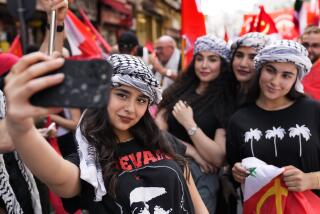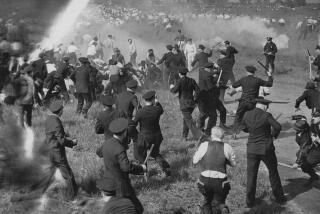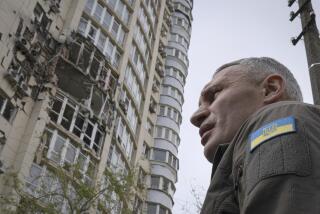May Day Marked by Protests, Rallies
- Share via
May Day, the international workers’ holiday, included pitched battles with police, demands for better jobs, orderly parades and nostalgic mourning for communism.
In Istanbul, Turkish riot police encased in armor, wielding batons and firing water cannons dispersed stone-throwing leftists at a 70,000-strong rally.
Dozens of protesters were injured, most beaten by police, and more than 100 were detained.
In Seoul, South Korean riot police fired tear gas at thousands of rock-throwing workers protesting growing layoffs caused by the economic crisis that has swept east Asia.
Police in Moscow said 30,000 people tuned out at a Communist May Day march.
Some carried portraits of Soviet dictator Josef Stalin or banners attacking President Boris N. Yeltsin’s government.
It was a far cry from the millions who thronged the city on May Day in Soviet times. After Yeltsin became president, he put an end to official parades in Red Square.
In Poland, leftist May Day marchers and right-wingers threw insults and objects at each other in several cities.
But in still-Communist Cuba, hundreds of thousands took part in parades to show support for their one-party socialist system and rejection of the U.S. trade embargo.
Higher wages were the issue in Mexico City, where tens of thousands of workers rallied.
President Ernesto Zedillo, speaking at a public ceremony, pledged to improve Mexicans’ working conditions.
“The government is with you in your demands . . . for your right to a dignified job, a fair salary and good labor benefits,” he said.
China marked the day with newspaper editorials that hailed workers as “the masters of the nation, the masters of enterprise” but urged them to support reforms of state industry expected to put 10 million people out of work.
In Japan, police said about 275,000 marched nationwide to demand better treatment. The marches came at the end of a week in which figures showed unemployment had jumped to 3.9%, the worst figure since the end of World War II.
In Calcutta, hundreds of prostitutes rallied for the legalization of their profession in India.
Thousands paraded through the Mozambique capital of Maputo, protesting low wages and mass redundancies they blamed on the government’s privatization program.
Zimbabwe’s trade union chiefs used May Day rallies to warn that they plan a five-day strike to press demands for tax cuts and to repeat their calls for fresh leadership after 18 years under President Robert Mugabe.
More to Read
Sign up for Essential California
The most important California stories and recommendations in your inbox every morning.
You may occasionally receive promotional content from the Los Angeles Times.













